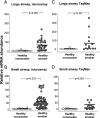Smoking-induced upregulation of AKR1B10 expression in the airway epithelium of healthy individuals
- PMID: 20705797
- PMCID: PMC2998206
- DOI: 10.1378/chest.09-2634
Smoking-induced upregulation of AKR1B10 expression in the airway epithelium of healthy individuals
Abstract
Background: The aldo-keto reductase (AKR) gene superfamily codes for monomeric, soluble reduced nicotinamide adenine dinucleotide phosphate-dependent oxidoreductases that mediate elimination reactions. AKR1B10, an AKR that eliminates retinals, has been observed as upregulated in squamous metaplasia and non-small cell lung cancer and has been suggested as a diagnostic marker specific to tobacco-related carcinogenesis. We hypothesized that upregulation of AKR1B10 expression may be initiated in healthy smokers prior to the development of evidence of lung cancer.
Methods: Expression of AKR1B10 was assessed at the mRNA level using microarrays with TaqMan confirmation in the large airway epithelium (21 healthy nonsmokers, 31 healthy smokers) and small airway epithelium (51 healthy nonsmokers, 58 healthy smokers) obtained by fiberoptic bronchoscopy and brushing.
Results: Compared with healthy nonsmokers, AKR1B10 mRNA levels were significantly upregulated in both large and small airway epithelia of healthy smokers. Consistent with the mRNA data, AKR1B10 protein was significantly upregulated in the airway epithelium of healthy smokers as assessed by Western blot analysis and immunohistochemistry, with AKR1B10 expressed in both differentiated and basal cells. Finally, cigarette smoke extract mediated upregulation of AKR1B10 in airway epithelial cells in vitro, and transfection of AKR1B10 into airway epithelial cells enhanced the conversion of retinal to retinol.
Conclusions: Smoking per se mediates upregulation of AKR1B10 expression in the airway epithelia of healthy smokers with no evidence of lung cancer. In the context of these observations and the link of AKR1B10 to the metabolism of retinals and to lung cancer, the smoking-induced upregulation of AKR1B10 may be an early process in the multiple events leading to lung cancer.
Figures




References
-
- Hyndman D, Bauman DR, Heredia VV, Penning TM. The aldo-keto reductase superfamily homepage. Chem Biol Interact. 2003;143-144:621–631. - PubMed
-
- Jez JM, Flynn TG, Penning TM. A new nomenclature for the aldo-keto reductase superfamily. Biochem Pharmacol. 1997;54(6):639–647. - PubMed
-
- Jez JM, Penning TM. The aldo-keto reductase (AKR) superfamily: an update. Chem Biol Interact. 2001;130-132(1-3):499–525. - PubMed
Publication types
MeSH terms
Substances
Grants and funding
LinkOut - more resources
Full Text Sources
Other Literature Sources
Molecular Biology Databases

